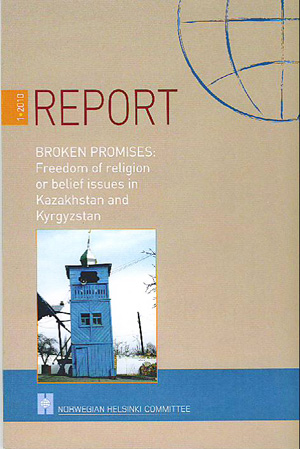There are in both Kazakhstan and Kyrgyzstan threats to freedom of religion or belief and other fundamental rights, which are ongoing and caused by the actions of the states. Kazakhstan and Kyrgyzstan are participating States in the Organisation for Security and Co-operation in Europe (OSCE), and have committed themselves to implementing OSCE commitments to strengthen freedom of religion or belief and other fundamental freedoms. Kazakhstan is currently (2010) the Chairman-in-Office of the OSCE, the first Central Asian and former Soviet country to take on this role.
Forum 18 News Service, the Norwegian Helsinki Committee, the Oslo Coalition on Freedom of Religion or Belief, the Oslo Center for Peace and Human Rights and the Norwegian Mission to the East have joined together in a project aimed at strengthening freedom of religion or belief in Kazakhstan and Kyrgyzstan, funded by the Royal Norwegian Foreign Ministry. This report is part of that project. It is compiled by Forum 18 with input from all project partners and outlines:
- The current state of freedom of religion or belief in Kazakhstan
- The current state of freedom of religion or belief in Kyrgyzstan
- What freedom of religion or belief is in international human rights law
- The most important OSCE human dimension commitments in the field of freedom of religion or belief, from 1975 to the end of 2009
In Kazakhstan there are continuing violations of human rights commitments. Serious violations include: attacks on religious freedom by officials ranging from President Nursultan Nazarbaev down to local officials; literature censorship; state-sponsored encouragement of religious intolerance; legal restrictions on freedom of religion or belief; raids, interrogations, threats and fines affecting both registered and unregistered religious communities and individuals; unfair trials; the jailing of a few particularly disfavoured religious believers; restrictions on the social and charitable work of religious communities; close police and KNB secret police surveillance of religious communities; and attempts to deprive religious communities of their property.
These violations interlock with violations of other fundamental human rights, such as freedom of expression and of association. The Administrative Code – a fundamental part of the legal system – is being revised, and the current draft continues the existing punishments for peaceful religious activity.
In Kyrgyzstan the state continues to violate its commitments to implement freedom of religion or belief for all. Limitations on this fundamental freedom and other human rights have increased – in both law and practice – under President Kurmanbek Bakiev.
While it is difficult to conclude on future developments in the field after the fall of Bakiev in April 2010, it is clear that any future government will face difficult challenges in order to bring the country in compliance to international standards. The struggling leadership of the Interim government led by Roza Otunbaeva has faced dramatic conflicts and killings in South Kyrgyzstan in June 2010, splitting the population along ethnic lines (Kyrgyz-Uzbek).
A harsh new Religion Law was adopted in 2009, despite international protests, and a similarly harsh new Law on Religious Education and Educational Institutions is being drafted. There are also plans for a new Law on Traditional Religions.
State actions, including banning unregistered religious activity and raids on meetings for worship, show little sign of either a willingness to implement human rights commitments, or an understanding that genuine security depends on genuine respect for human rights. As a Baha’i put it: «Our country has so many urgent problems – poverty, the lack of medicine, AIDS, crime, corruption. Why don’t officials work on these instead of making life harder for religious believers?»
State actions and policies which directly undermine the implementation of OSCE commitments both undermine the security of individual states and OSCE regional security. As workshops organised by Kyrgyz NGO Foundation for Tolerance International and the example of neighbouring Uzbekistan demonstrates, repression increases support for extremist and violent movements. In this context, it is increasingly important that both Kazakhstan and Kyrgyzstan implement their OSCE commitments as part of seeking and implementing alternatives to repressive state actions.
